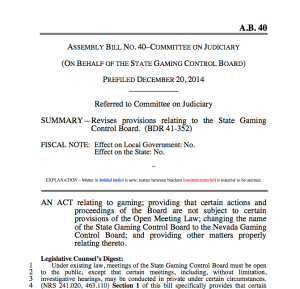As we wind down on the first week of the 2015 legislative session, here’s a recap of the testimony I gave on bills:
SB59 — A bill from the Secretary of State’s Office, it would make confidential all information submitted to the office’s online business portal, the Silver Flume.
 The intent of the bill isn’t to make anything confidential that’s not already, but to protect it while it’s in the business portal until it can be shipped to the various agencies that are clients of the ‘one-stop shop’ system. Some of that info is confidential; some isn’t.
The intent of the bill isn’t to make anything confidential that’s not already, but to protect it while it’s in the business portal until it can be shipped to the various agencies that are clients of the ‘one-stop shop’ system. Some of that info is confidential; some isn’t.
Our point is that the confidential information already is covered elsewhere in state statute. We don’t think that provision is necessary in this bill.
AB43 — From the Nevada Department of Transportation, this bill seeks to keep confidential all information submitted by applicants to design-build projects until the contract is awarded.
Similarly, this bill also seeks to insert ‘confidential’ language where it doesn’t seem necessary. We agree that bidders’ proposals need to be secret while the process is open — but not ‘all information’ and only until the bid deadline passes.
The statute already protects financial and other ‘proprietary’ information.
AB40 — An open-meetings exemption sought by the Gaming Control Board, this one is a bit more complicated.
The Gaming Control Board wants to be able to meet in private when it considers whether to file a violation against a gaming-license holder. If a complaint of a violation is filed with the Nevada Gaming Commission, it becomes public.
The GCB has closed these meetings historically, under a provision in statute giving it an exemption from the Open Meeting Law for ‘investigative hearings.’ When in doubt, they brought in an attorney so they could claim attorney-client privilege. It’s a murky area, and they asked the Legislature to clarify it.
We have no problem with the need to carry out an investigation privately. The question comes when the GCB determines that an alleged violation isn’t worth pursuing by filing a formal complaint with the Commission, or when it negotiates a settlement with a licensee before filing a complaint.
The Gaming Control Board acts like a prosecutor in these cases; the Gaming Commission acts as the judge, and its deliberations are open. The question we asked was, ‘How do we know what’s going on with the allegations that, in the view of the GCB, don’t rise to the level of a violation?’
There is precedent in statute for regulatory boards to carry out their investigations in private. And the GCB has a number of exemptions in law, as well as unique statutes and regulations, making it different than other state regulatory agencies.
We think the language can be narrowed in the bill. Perhaps the solution lies in its existing exemption by defining ‘investigative hearing’ without further broadening the exception to the Open Meeting Law.
 Nevada Press Association The best in Nevada journalism since 1924
Nevada Press Association The best in Nevada journalism since 1924
No comments
Pingback: Latest NPA testimony on bills | Nevada Press ink by the barrel